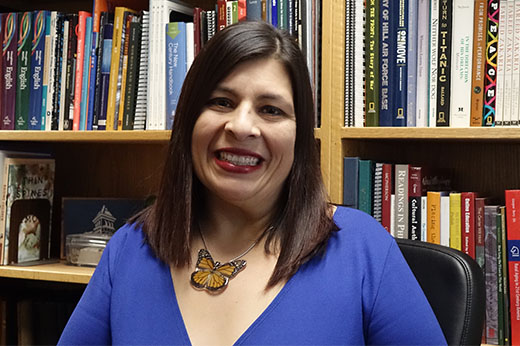Dr. Marisela Martinez-Cola, ‘18G was the first presenter of the Emory Sociology Speaker Series. The Laney Graduate School alum and current assistant professor of Sociology at Utah State University presented an overview of her research that focuses on pivotal desegregation court cases preceding Brown v. Board of Education.
The Sociology Speaker Series brings sociologists from various institutions to Emory to share their research and collaborate with other scholars in the social sciences.
The cases Martinez-Cola presented included Mendez v. Westminister, Tape v. Hurley, and Piper v. Big Pine School District. These cases are included in Martinez-Cola’s dissertation and her book titled, The Bricks Before Brown v. Board of Education. The book, which is under consideration for academic publishing, compiles and analyzes 104 court cases centered around segregated schools. The featured litigations include 93 African American cases, two cases involving Mexican Americans, four cases involving Chinese Americans and five cases involving Native Americans.
Being the first person to attend college in her family, Martinez-Cola thought she would follow what she considered to be the typical path of any first-generation college student: law school, medicine or engineering.
“I stink at math and science, so that knocked two out,” jokes Martinez-Cola.
However, Martinez-Cola came to the University of Michigan to double major in African American studies and psychology. While she would go on to receive her Juris Doctorate from the Loyola Chicago School of Law, Martinez-Cola later decided to also pursue her PhD in sociology, a decision heavily influenced by the knowledge gained in her African American studies course.
“It felt like I finally had a really amazing meal after starving for a very long time,” says Martinez-Cola.
After practicing law for a year, Martinez-Cola transitioned into multicultural affairs at schools such as Davenport University, George Washington University and the University of Georgia, working in the field for almost a decade. Meanwhile, her fascination with legal cases predating Brown compelled her to collect court cases, many of which centered around Chinese, Latina and Native Americans.
“I thought, ‘there must be similar cases in the other racial groups because it applies to us too,’” she says. “As I started looking for cases, my mind really opened up.”
Martinez-Cola’s scholarship is an interdisciplinary fusion of law, history and critical race theory. While at Emory, the LGS graduate taught a pedagogical course on the sociology of race and ethnicity called Race and Ethnicity and collaborated with her students to publish the article “When Pedagogy is Painful: Teaching in Tumultuous Times.”
The article discusses the complicated experiences of both Martinez-Cola and her students as they studied past and concurrent racial injustices.
“I was really proud to put that out there and it was a diverse group of students that I worked with, so I felt I got a chance to stick with my mission and purpose…” she explains.
A part of that mission and purpose centers around mentoring and empowering first-generation students of color through scholarship. Similar to what she did with the “When Pedagogy is Painful” article, Martinez-Cola is currently working on a research article called “Finding Alice Piper,” which aims to tell the life story of the Paiute girl at the center of Piper v. Big Pine. Martinez-Cola is collaborating with two first-generation students of color, one Navajo and the other Latina, for the project.
“The article will be about three women of color searching for another woman color, and what that experience was like for us all,” Martinez-Cola explained.
Her desire to mentor students like herself is a continuation of the help she received from her mentors. With help from fellow first-generation college graduate and chair of Emory’s sociology department, Dr. Timothy Dowd, Martinez-Cola learned to communicate the sociological aspects of her research. In effect, he acted as her translator.
“I recalled the struggles and adjustments that I had to make as a first-gen in both realms, and in turn, I could talk with Marisela about them, as well as the strategies and solutions I took,” says Dowd. “She's a brilliant scholar with an incredible drive as well as impressive concern for others. It truly is my honor to be her friend and colleague.”
For Martinez-Cola, the label of “first-gen” was not always held in high regard at the start of her academic career by other people. But now, being a first-generation, college graduate of color is a source of pride for herself, and she considers the opportunity to help similar first-generation students find their own path extraordinarily fulfilling.
“I went to Michigan, and I represented my Chicano American community,” Martinez-Cola says. “First-gen students…are so used to accommodating everybody else’s dreams that they haven’t quite defined their own. It’s nice to tell them their dreams are valid and there’s a path to get there.”

